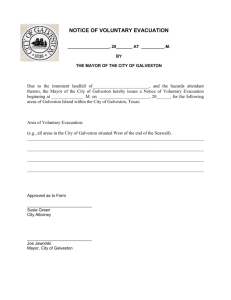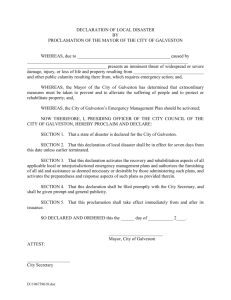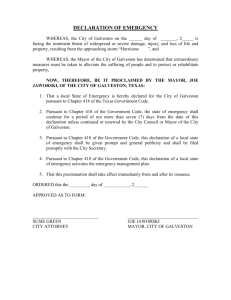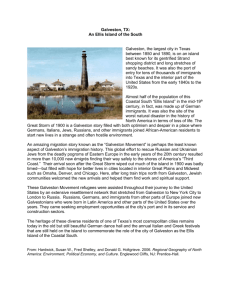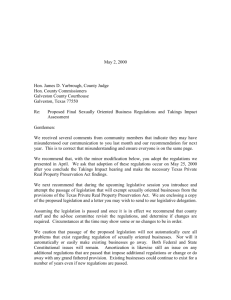Moves to redraw districts gain steam: Supreme Court’s weakening of... Rights Act stirs up passions in Pasadena, Galveston
advertisement
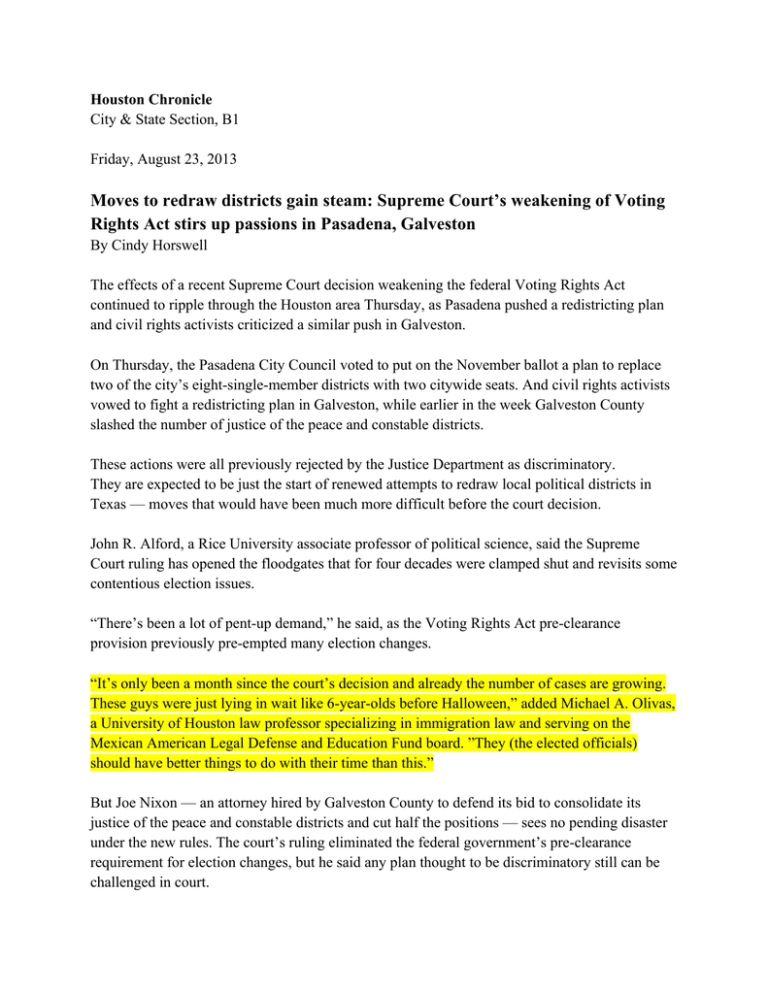
Houston Chronicle City & State Section, B1 Friday, August 23, 2013 Moves to redraw districts gain steam: Supreme Court’s weakening of Voting Rights Act stirs up passions in Pasadena, Galveston By Cindy Horswell The effects of a recent Supreme Court decision weakening the federal Voting Rights Act continued to ripple through the Houston area Thursday, as Pasadena pushed a redistricting plan and civil rights activists criticized a similar push in Galveston. On Thursday, the Pasadena City Council voted to put on the November ballot a plan to replace two of the city’s eight-single-member districts with two citywide seats. And civil rights activists vowed to fight a redistricting plan in Galveston, while earlier in the week Galveston County slashed the number of justice of the peace and constable districts. These actions were all previously rejected by the Justice Department as discriminatory. They are expected to be just the start of renewed attempts to redraw local political districts in Texas — moves that would have been much more difficult before the court decision. John R. Alford, a Rice University associate professor of political science, said the Supreme Court ruling has opened the floodgates that for four decades were clamped shut and revisits some contentious election issues. “There’s been a lot of pent-up demand,” he said, as the Voting Rights Act pre-clearance provision previously pre-empted many election changes. “It’s only been a month since the court’s decision and already the number of cases are growing. These guys were just lying in wait like 6-year-olds before Halloween,” added Michael A. Olivas, a University of Houston law professor specializing in immigration law and serving on the Mexican American Legal Defense and Education Fund board. ”They (the elected officials) should have better things to do with their time than this.” But Joe Nixon — an attorney hired by Galveston County to defend its bid to consolidate its justice of the peace and constable districts and cut half the positions — sees no pending disaster under the new rules. The court’s ruling eliminated the federal government’s pre-clearance requirement for election changes, but he said any plan thought to be discriminatory still can be challenged in court. Last year, Galveston County commissioners failed to gain pre-clearance for a similar plan to slash the number of justice of the peace and constable positions. One reason cited by the U.S. Justice Department was that the county’s lone minority commissioner had been excluded from drawing up that plan, and that same commissioner said he was unaware of the new plan that’s been adopted. Large disparities But Nixon believes that the plan adopted Monday, if challenged, will easily hold up. “The state constitution requires an efficient system of justice. We found some of our nine justices of the peace were only handling one case a day, while others were working very hard and handling the bulk of the case load. When we made a comparison with Harris County,” he said, “we found one justice of the peace whose work in one month equaled what all our nine did in a year.” Nixon said the reduction of the number justices and constables — to four each — would save the county more than a million dollars a year. Steve McIntyre, spokesman for Gulf Coast Interfaith, questioned that data, however, and said more study is needed. The ad hoc group, which includes representatives of the NAACP and others, sent a letter Thursday to the city of Galveston’s attorney also questioning the wisdom of the city seeking to make a change by having two council seats elected citywide, rather than coming from individual districts. Similar plans were shot down four different times when submitted to the Justice Department for pre-clearance. In the letter, the ad hoc group said the city is taking the opportunity provided by the court decision “to attack the voting rights of the minority community.” The letter called the plan part of a “racist onslaught of efforts around America to turn the clock back,” and said that Galveston will be one of the places where there is a “pitched political battle to obtain and maintain equal rights.” The proposed plan, the group said, would reduce the number of districts in which the majority of the residents were minority from three to two. A broader view? But the Galveston council, which has hired an attorney to study the possibility of resurrecting this redistricting plan, believes an at-large councilman will take a broader, rather than parochial, view of the city’s needs. Similarly, the Pasadena City Council by a narrow 5-4 margin voted Thursday to put a similar proposal to create two at-large districts on its Nov. 5 ballot. One of two Hispanic councilmen, Cody Ray Wheeler, noted this was the same plan that the Justice Department rejected just last year when pre-clearance was still a requirement. Council members who supported Mayor Johnny Isbell’s plan said it would give citizens more people to vote for. Wheeler said voters do not know where those boundary lines will be drawn as no map is included. “There’s going to be a lot of back-room deals and conniving,” he said. Harvey Rice contributed to this story. cindy.horswell@chron.com
